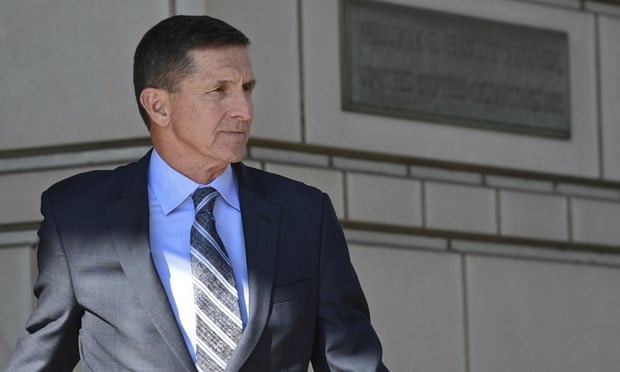The guilty plea entered on Friday by Donald Trump’s former national security adviser, Michael Flynn, has raised critical new questions not only about the relationship between the Trump team and Russian officials – but also whether Flynn and other members of the Trump transition team were improperly lobbying on behalf of Israel.
Among the statements about which Flynn has admitted lying to the FBI is his depiction of a conversation with the then Russian ambassador, Sergey Kislyak, relating to the run-up to the controversial December 2016 UN security council resolution 2334 on Israeli settlement building – which passed after the Obama administration abstained.
Israel, it was reported widely at the time, had been lobbying the team of then President-elect Trump in an attempt to derail the vote.
And according to the charge sheet against Flynn one of the false statements he has admitted giving to the FBI, was his denial that he had spoken to Kislyak on 22 December 2016 asking Russia to delay the vote on the UN resolution.
Quick GuideMichael Flynn and Russia: what we know so far
Show

Michael Flynn is the fourth Donald Trump aide to face criminal charges in the investigation into Russian interference in the 2016 US election and any alleged collusion.
Flynn has pleaded guilty to lying to the FBI – ‘making false, fictitious, and fraudulent statements’ about his contacts with Russia.
Flynn, as part of Trump’s transition team between the November 2016 election and the January 2017 inauguration, had secret contact with the Russian ambassador on at least two topics - shaping US and Russian policy on sanctions, and attempting to influence a UN vote about Israeli settlement-building.
Flynn is cooperating with investigators, and under the terms of his deal agreed to take polygraph lie-detector tests and appear as a witness in all relevant cases.
He admits that he discussed with another senior Trump transition official what he should say to the Russian ambassador Sergey Kislyak.
At least two members of the Trump transition team were briefed by him after his contact with Kislyak.
Flynn faces a maximum prison sentence of six months under the terms of his deal and a fine of up to $9,500.
While new information reveals secret contact with the Russians, it does not shed light on whether the Trump campaign colluded with Russia’s interference in the US election.
One reason that conversation is important – and potentially highly problematic for Trump and his inner circle – is because of comments made to CNN on 23 December the day after Flynn spoke to Kislyak – by an anonymous Israeli official.
That official admitted that Israel – and reportedly the prime minister, Benjamin Netanyahu, himself – had contacted Trump to seek his assistance in killing the resolution.
The official – in comments that may come back to haunt the White House – said that Israel had “implored the [Obama] White House not to go ahead and told them that if they did, we would have no choice but to reach out to President-elect Trump”.
“We did reach out to the president-elect,” the official added, “and are deeply appreciative that he weighed in, which was not a simple thing to do.”
Trump himself not only spoke out to condemn the resolution ahead of the vote – highly unusual for a president-elect – but his incoming national security adviser Flynn was also lobbying Moscow to act against then US foreign policy.
While the timeline remains circumstantial, it is highly suggestive. At a time when Israel was asking the Trump transition team to intervene to derail the resolution, the question is whether Flynn would have approached Kislyak on his own initiative.
Flynn’s own answer to that question – in his guilty plea – is now on the record, alleging that a senior member of the Trump transition team “directed” him to make contact with Russian officials in December 2016.
And while the identity of that “senior transition official” has not been revealed there have been hints, not least the Wall Street Journal’s report last month that special counsel Robert Mueller has been investigating the attempt by Trump’s son-in-law Jared Kushner to block the passage of the resolution 2334 – the same effort that Flynn, it now appears, lied to the FBI about.
